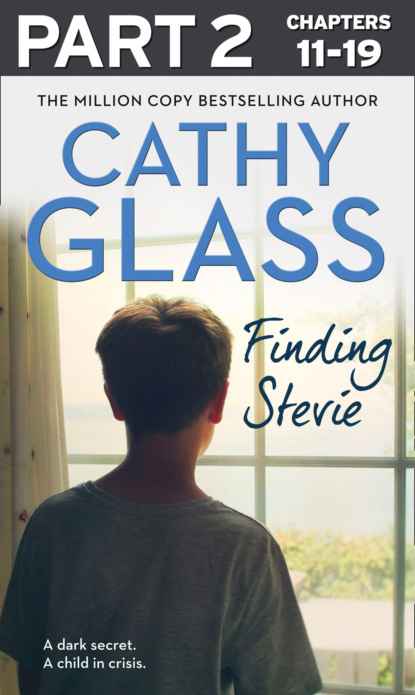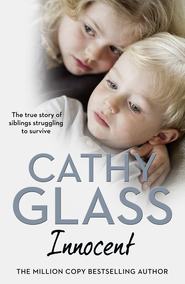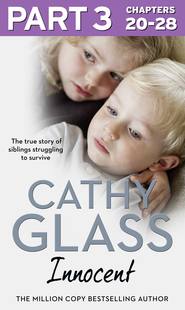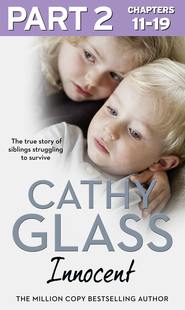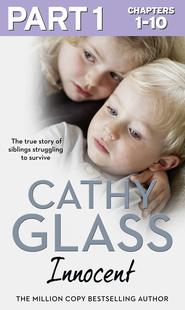По всем вопросам обращайтесь на: info@litportal.ru
(©) 2003-2024.
✖
Finding Stevie: Part 2 of 3: A teenager in crisis
Настройки чтения
Размер шрифта
Высота строк
Поля
Finding Stevie: Part 2 of 3: A teenager in crisis
Cathy Glass
Part 2 of 3Finding Stevie is a dark and poignant true story that highlights the dangers lurking on online.When Stevie’s social worker tells Cathy, an experienced foster carer, that Stevie, 14, is gender fluid she isn’t sure what that term means and looks it up.Stevie, together with his younger brother and sister, have been brought up by their grandparents as their mother is in prison. But the grandparents can no longer cope with Stevie’s behaviour so they place him in care.Stevie is exploring his gender identity, and like many young people he spends time online. Cathy warns him about the dangers of talking to strangers online and advises him how to stay safe. When his younger siblings tell their grandmother that they have a secret they can’t tell, Cathy is worried. However, nothing could have prepared her for the truth when Stevie finally breaks down and confesses what he’s done.
(#u924d1451-b3f9-5872-b71d-8944dba6858c)
Copyright (#u924d1451-b3f9-5872-b71d-8944dba6858c)
Certain details in this story, including names, places and dates, have been changed to protect the family’s privacy.
HarperElement
An imprint of HarperCollinsPublishers
1 London Bridge Street
London SE1 9GF
www.harpercollins.co.uk (http://www.harpercollins.co.uk)
First published by HarperElement 2019
FIRST EDITION
Text © Cathy Glass 2019
Cover layout design © HarperCollinsPublishers Ltd 2019
Cover photograph © Mark Owen/Trevillion Images (posed by a model)
A catalogue record of this book is available from the British Library
Cathy Glass asserts the moral right to be identified as the author of this work
All rights reserved under International and Pan-American Copyright Conventions. By payment of the required fees, you have been granted the nonexclusive, non-transferable right to access and read the text of this e-book on screen. No part of this text may be reproduced, transmitted, downloaded, decompiled, reverse engineered, or stored in or introduced into any information storage retrieval system, in any form or by any means, whether electronic or mechanical, now known or hereinafter invented, without the express written permission of HarperCollins e-books.
Find out about HarperCollins and the environment at
www.harpercollins.co.uk/green (http://www.harpercollins.co.uk/green)
Source ISBN: 9780008324292
Ebook Edition © February 2019 ISBN: 9780008324339
Version: 2019-01-09
Contents
Cover (#u583dfa44-7272-5be3-846a-d2a5154b48d6)
Title Page (#uc4ca1158-5eaa-5d2e-a446-266e5fc89142)
Copyright (#u18d636b4-ddb1-5205-bc7a-92b27ea7b79c)
Chapter Eleven: Missing (#ufe8fb990-c41d-537b-845f-d67e9c720914)
Chapter Twelve: Something Much Worse (#u25bff345-a798-5694-ba42-4ebd2c2228f9)
Chapter Thirteen: Confession (#u358bca86-bad4-5ac8-8096-679085410e27)
Chapter Fourteen: Disclosure (#litres_trial_promo)
Chapter Fifteen: Excluded (#litres_trial_promo)
Chapter Sixteen: Another Police Search (#litres_trial_promo)
Chapter Seventeen: Disappointing News (#litres_trial_promo)
Chapter Eighteen: Dejected and Moody (#litres_trial_promo)
Chapter Nineteen: Messed Up (#litres_trial_promo)
Moving Memoirs eNewsletter (#litres_trial_promo)
About the Publisher (#litres_trial_promo)
Chapter Eleven
Missing (#u924d1451-b3f9-5872-b71d-8944dba6858c)
The following day Stevie’s laptop was delivered and he was very pleased. Adrian, Lucy and Paula had their own laptops, and there was the PC with a printer in the front room for us all to use. As Stevie disappeared upstairs clutching his new laptop, it crossed my mind that he hadn’t ever responded to my Facebook friendship request, but I didn’t read anything into it. The need to see who he was in touch with online had lessened since he’d confessed about Joey, and his behaviour had settled down.
February arrived and we woke up one Sunday morning to find a thick blanket of snow, and everyone became a child again. Because it was Sunday we were all at home and could make the most of it. Adrian had arranged to see Kirsty, but they cancelled as the roads hadn’t been cleared and were unsafe to drive on. Big as my family were, when I suggested we got the toboggan out of the shed and took it to our local park, there were cheers of delight. Stevie said he’d been tobogganing when he’d lived with his grandparents and would have liked to have played in the snow with Liam and Kiri, but he understood that I couldn’t take him there in my car because of the snow and there weren’t any buses running.
The park is only a short walk from our house and is known in the area for the hill that makes a good toboggan run in the snow. It was late morning when we arrived and we saw some of our friends and neighbours there. Stevie saw a boy from his class and they chatted for a few minutes, then we dragged our toboggan to the top of the hill and took turns coming down. It was great fun and the air was alive with laughter and screams as children of all ages, and adults, hurtled down the slope on toboggans, trays, sheets of plastic and cardboard – anything that would slide. We were there for a couple of hours and then, with our cheeks glowing from the cold, we returned home for hot drinks and lunch.
While I love summer, I think winter has a special quality in bringing families closer together. With the curtains closed against a cold night sky, no one is in any rush to go out and everyone is more content to spend time with each other in the warmth of the house. Winter seems to cocoon the family and strengthen family bonds, although perhaps that’s just me being sentimental. At the weekends we group around board games – Scrabble, Monopoly, Cluedo and so on – and play with a real competitive spirit. Stevie said nostalgically that he used to play board games with just him and his grandparents when Kiri and Liam had been little. ‘That’s a nice memory,’ I said. ‘Why not suggest playing next time you’re there? Kiri and Liam are old enough to join in now.’ I thought again what a good job of parenting Peggy and Fred had done and how committed they’d been to raising Stevie and then later Kiri and Liam. They’d had no retirement in which they could slow the pace and take things easy, and I hoped Stevie appreciated that.
The whole of February was bitterly cold, although we didn’t get any more snow. Then March arrived and the first green buds of spring started to appear. Stevie had been with us for two months and I felt everything was going well. I’d had a chat with Verity and she’d confirmed the way I was fostering Stevie was fine, and she’d spoken to Fred and Peggy about this. Stevie was attending school, seeing his grandparents and Liam and Kiri a couple of times a week, and getting along with my family. Indeed, it was difficult to remember a time before he’d arrived, although of course I’d never forget the other children I’d fostered.
Then suddenly and dramatically, almost overnight, Stevie changed. He became withdrawn, moody and snapped if anyone asked him what was the matter. It was difficult to get him to shower and he spent most of the time in his room. He wanted his meals there too, although I insisted he come down to eat with us, as I thought the last thing he needed was to spend more time alone. When I asked him what was worrying him – which I did often – he said, ‘Nothing.’ If I pressed him, he just got annoyed.
Stevie’s behaviour continued for a week. I noted the change in my log and also telephoned Verity. She said she’d talk to Stevie to see if he would tell her what was wrong, but it wouldn’t be for a few days, as she was in court on another case for most of the week. She added that Stevie should really see a therapist at CAMHS and she’d suggest it to him again.
Stevie had stopped visiting his grandparents and when I asked him why he said sulkily, ‘Don’t want to go.’
‘Have you and your grandfather been arguing?’ I asked.
‘No more than usual,’ came his terse response.
Cathy Glass
Part 2 of 3Finding Stevie is a dark and poignant true story that highlights the dangers lurking on online.When Stevie’s social worker tells Cathy, an experienced foster carer, that Stevie, 14, is gender fluid she isn’t sure what that term means and looks it up.Stevie, together with his younger brother and sister, have been brought up by their grandparents as their mother is in prison. But the grandparents can no longer cope with Stevie’s behaviour so they place him in care.Stevie is exploring his gender identity, and like many young people he spends time online. Cathy warns him about the dangers of talking to strangers online and advises him how to stay safe. When his younger siblings tell their grandmother that they have a secret they can’t tell, Cathy is worried. However, nothing could have prepared her for the truth when Stevie finally breaks down and confesses what he’s done.
(#u924d1451-b3f9-5872-b71d-8944dba6858c)
Copyright (#u924d1451-b3f9-5872-b71d-8944dba6858c)
Certain details in this story, including names, places and dates, have been changed to protect the family’s privacy.
HarperElement
An imprint of HarperCollinsPublishers
1 London Bridge Street
London SE1 9GF
www.harpercollins.co.uk (http://www.harpercollins.co.uk)
First published by HarperElement 2019
FIRST EDITION
Text © Cathy Glass 2019
Cover layout design © HarperCollinsPublishers Ltd 2019
Cover photograph © Mark Owen/Trevillion Images (posed by a model)
A catalogue record of this book is available from the British Library
Cathy Glass asserts the moral right to be identified as the author of this work
All rights reserved under International and Pan-American Copyright Conventions. By payment of the required fees, you have been granted the nonexclusive, non-transferable right to access and read the text of this e-book on screen. No part of this text may be reproduced, transmitted, downloaded, decompiled, reverse engineered, or stored in or introduced into any information storage retrieval system, in any form or by any means, whether electronic or mechanical, now known or hereinafter invented, without the express written permission of HarperCollins e-books.
Find out about HarperCollins and the environment at
www.harpercollins.co.uk/green (http://www.harpercollins.co.uk/green)
Source ISBN: 9780008324292
Ebook Edition © February 2019 ISBN: 9780008324339
Version: 2019-01-09
Contents
Cover (#u583dfa44-7272-5be3-846a-d2a5154b48d6)
Title Page (#uc4ca1158-5eaa-5d2e-a446-266e5fc89142)
Copyright (#u18d636b4-ddb1-5205-bc7a-92b27ea7b79c)
Chapter Eleven: Missing (#ufe8fb990-c41d-537b-845f-d67e9c720914)
Chapter Twelve: Something Much Worse (#u25bff345-a798-5694-ba42-4ebd2c2228f9)
Chapter Thirteen: Confession (#u358bca86-bad4-5ac8-8096-679085410e27)
Chapter Fourteen: Disclosure (#litres_trial_promo)
Chapter Fifteen: Excluded (#litres_trial_promo)
Chapter Sixteen: Another Police Search (#litres_trial_promo)
Chapter Seventeen: Disappointing News (#litres_trial_promo)
Chapter Eighteen: Dejected and Moody (#litres_trial_promo)
Chapter Nineteen: Messed Up (#litres_trial_promo)
Moving Memoirs eNewsletter (#litres_trial_promo)
About the Publisher (#litres_trial_promo)
Chapter Eleven
Missing (#u924d1451-b3f9-5872-b71d-8944dba6858c)
The following day Stevie’s laptop was delivered and he was very pleased. Adrian, Lucy and Paula had their own laptops, and there was the PC with a printer in the front room for us all to use. As Stevie disappeared upstairs clutching his new laptop, it crossed my mind that he hadn’t ever responded to my Facebook friendship request, but I didn’t read anything into it. The need to see who he was in touch with online had lessened since he’d confessed about Joey, and his behaviour had settled down.
February arrived and we woke up one Sunday morning to find a thick blanket of snow, and everyone became a child again. Because it was Sunday we were all at home and could make the most of it. Adrian had arranged to see Kirsty, but they cancelled as the roads hadn’t been cleared and were unsafe to drive on. Big as my family were, when I suggested we got the toboggan out of the shed and took it to our local park, there were cheers of delight. Stevie said he’d been tobogganing when he’d lived with his grandparents and would have liked to have played in the snow with Liam and Kiri, but he understood that I couldn’t take him there in my car because of the snow and there weren’t any buses running.
The park is only a short walk from our house and is known in the area for the hill that makes a good toboggan run in the snow. It was late morning when we arrived and we saw some of our friends and neighbours there. Stevie saw a boy from his class and they chatted for a few minutes, then we dragged our toboggan to the top of the hill and took turns coming down. It was great fun and the air was alive with laughter and screams as children of all ages, and adults, hurtled down the slope on toboggans, trays, sheets of plastic and cardboard – anything that would slide. We were there for a couple of hours and then, with our cheeks glowing from the cold, we returned home for hot drinks and lunch.
While I love summer, I think winter has a special quality in bringing families closer together. With the curtains closed against a cold night sky, no one is in any rush to go out and everyone is more content to spend time with each other in the warmth of the house. Winter seems to cocoon the family and strengthen family bonds, although perhaps that’s just me being sentimental. At the weekends we group around board games – Scrabble, Monopoly, Cluedo and so on – and play with a real competitive spirit. Stevie said nostalgically that he used to play board games with just him and his grandparents when Kiri and Liam had been little. ‘That’s a nice memory,’ I said. ‘Why not suggest playing next time you’re there? Kiri and Liam are old enough to join in now.’ I thought again what a good job of parenting Peggy and Fred had done and how committed they’d been to raising Stevie and then later Kiri and Liam. They’d had no retirement in which they could slow the pace and take things easy, and I hoped Stevie appreciated that.
The whole of February was bitterly cold, although we didn’t get any more snow. Then March arrived and the first green buds of spring started to appear. Stevie had been with us for two months and I felt everything was going well. I’d had a chat with Verity and she’d confirmed the way I was fostering Stevie was fine, and she’d spoken to Fred and Peggy about this. Stevie was attending school, seeing his grandparents and Liam and Kiri a couple of times a week, and getting along with my family. Indeed, it was difficult to remember a time before he’d arrived, although of course I’d never forget the other children I’d fostered.
Then suddenly and dramatically, almost overnight, Stevie changed. He became withdrawn, moody and snapped if anyone asked him what was the matter. It was difficult to get him to shower and he spent most of the time in his room. He wanted his meals there too, although I insisted he come down to eat with us, as I thought the last thing he needed was to spend more time alone. When I asked him what was worrying him – which I did often – he said, ‘Nothing.’ If I pressed him, he just got annoyed.
Stevie’s behaviour continued for a week. I noted the change in my log and also telephoned Verity. She said she’d talk to Stevie to see if he would tell her what was wrong, but it wouldn’t be for a few days, as she was in court on another case for most of the week. She added that Stevie should really see a therapist at CAMHS and she’d suggest it to him again.
Stevie had stopped visiting his grandparents and when I asked him why he said sulkily, ‘Don’t want to go.’
‘Have you and your grandfather been arguing?’ I asked.
‘No more than usual,’ came his terse response.
Другие электронные книги автора Cathy Glass
Innocent




 0
0





